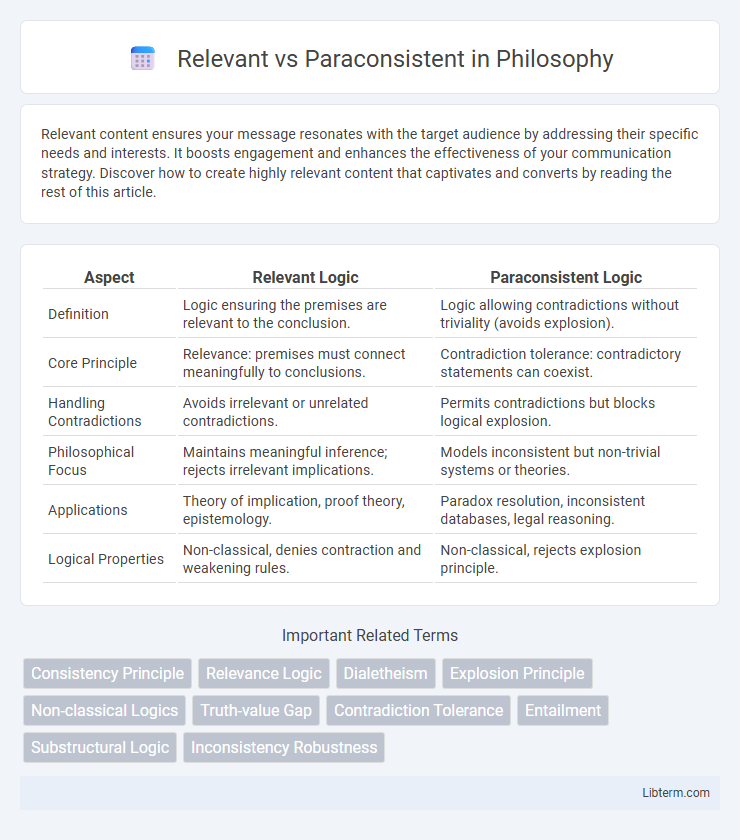Relevant content ensures your message resonates with the target audience by addressing their specific needs and interests. It boosts engagement and enhances the effectiveness of your communication strategy. Discover how to create highly relevant content that captivates and converts by reading the rest of this article.
Table of Comparison
| Aspect | Relevant Logic | Paraconsistent Logic |
|---|---|---|
| Definition | Logic ensuring the premises are relevant to the conclusion. | Logic allowing contradictions without triviality (avoids explosion). |
| Core Principle | Relevance: premises must connect meaningfully to conclusions. | Contradiction tolerance: contradictory statements can coexist. |
| Handling Contradictions | Avoids irrelevant or unrelated contradictions. | Permits contradictions but blocks logical explosion. |
| Philosophical Focus | Maintains meaningful inference; rejects irrelevant implications. | Models inconsistent but non-trivial systems or theories. |
| Applications | Theory of implication, proof theory, epistemology. | Paradox resolution, inconsistent databases, legal reasoning. |
| Logical Properties | Non-classical, denies contraction and weakening rules. | Non-classical, rejects explosion principle. |
Introduction to Relevance and Paraconsistency
Relevance logic emphasizes the necessity that premises bear a direct connection to the conclusion, ensuring that implications are meaningful and avoid irrelevant information. Paraconsistent logic allows reasoning in the presence of contradictions without collapsing into triviality, enabling systems to tolerate inconsistencies while preserving useful inferences. Both approaches challenge classical logic's limitations by addressing issues of implication and contradiction in different but complementary ways.
Defining Relevance Logic
Relevance logic is a non-classical logic emphasizing that the premises of an argument must be relevant to its conclusion, avoiding the paradoxes of material implication found in classical logic. It rejects the principle that any statement follows from a contradiction, contrasting sharply with paraconsistent logic, which tolerates contradictions without collapsing into triviality. By ensuring relevance, this logic maintains a strict connection between antecedent and consequent, enhancing the reliability of logical inference in complex reasoning systems.
Understanding Paraconsistent Logic
Paraconsistent logic challenges classical logic by allowing contradictory statements to coexist without leading to triviality, enabling reasoning in the presence of inconsistency. Unlike relevant logic, which demands a strict relevance relation between premises and conclusions, paraconsistent logic relaxes explosive inference rules to handle paradoxes and incomplete information effectively. This approach is crucial in fields like artificial intelligence and knowledge representation, where data often contains conflicts that must be managed without compromising overall system integrity.
Key Differences Between Relevance and Paraconsistent Logics
Relevant logic emphasizes the importance of the relevance of premises to conclusions, rejecting the principle of explosion to avoid trivialization when contradictions arise. Paraconsistent logic allows for contradictions to exist without entailing every possible statement, enabling reasoning in inconsistent but non-trivial systems. Key differences include relevance logic's strict connection between antecedents and consequents versus paraconsistent logic's tolerance for contradictions and preservation of meaningful inference.
Historical Development and Philosophical Motivation
Relevant logic emerged in the mid-20th century as a response to classical logic's paradoxes of implication, emphasizing that the premises must be relevant to the conclusion, a motivation rooted in preserving meaningful inference and avoiding triviality. Paraconsistent logic developed earlier, primarily in the 1960s and 1970s, to handle contradictions without collapsing into explosion, motivated by the need to model inconsistent but non-trivial reasoning systems. Both logics challenge principles of classical logic but diverge philosophically: relevant logic insists on relevance to maintain semantic coherence, while paraconsistent logic accepts contradictions to reflect real-world inconsistency.
Applications in Computer Science and Artificial Intelligence
Relevant logic supports applications requiring strict resource management and context-sensitive reasoning, such as automated theorem proving and knowledge representation in artificial intelligence. Paraconsistent logic excels in handling inconsistent or incomplete data, making it invaluable for fault-tolerant systems, database theory, and reasoning under uncertainty in AI. Both logics enhance computational models by enabling robust inference mechanisms in environments where classical logic fails due to irrelevant or contradictory information.
Handling Contradictions: A Comparative Analysis
Relevant logic minimizes contradictions by enforcing strict relevance between premises and conclusions, ensuring that contradictions do not lead to trivial conclusions. Paraconsistent logic tolerates contradictions without collapsing into triviality, allowing contradictory information to coexist without invalidating the entire system. This result highlights the key difference: Relevant logic restricts inferential leaps to maintain relevance, while paraconsistent logic structurally accommodates contradictions to preserve consistency in reasoning.
Limitations and Criticisms of Each Approach
Relevant logic faces limitations in handling contradictions without trivialization, often criticized for its strict relevance condition that excludes some classical valid inferences. Paraconsistent logic, while adept at tolerating contradictions and preventing logical explosion, is sometimes challenged for its counterintuitive acceptance of conflicting information and the difficulty of defining consistent inference rules. Both approaches struggle with balancing intuitive reasoning and formal robustness, leading to debates over their applicability in practical and philosophical contexts.
Future Directions in Non-Classical Logic
Future directions in non-classical logic emphasize expanding relevant and paraconsistent frameworks to better handle contradictions without triviality and maintain relevance in inference. Advances in computational models integrate paraconsistent reasoning for robust AI systems that operate reliably under inconsistent data. Research explores hybrid systems combining relevance logic's strict implication with paraconsistent approaches to enhance expressive power and applicability in dynamic knowledge bases.
Conclusion: Choosing Between Relevant and Paraconsistent Logics
Selecting between relevant and paraconsistent logics depends on the specific requirements for handling contradictions and preserving entailment. Relevant logic ensures that conclusions are meaningfully connected to premises, avoiding irrelevant inferences, whereas paraconsistent logic tolerates contradictions without trivializing the system, useful for inconsistent but non-explosive reasoning contexts. Practical applications in computer science and philosophy guide the choice, with relevant logic favored for strict relevance and paraconsistent logic preferred when managing inconsistent data effectively.
Relevant Infographic

 libterm.com
libterm.com